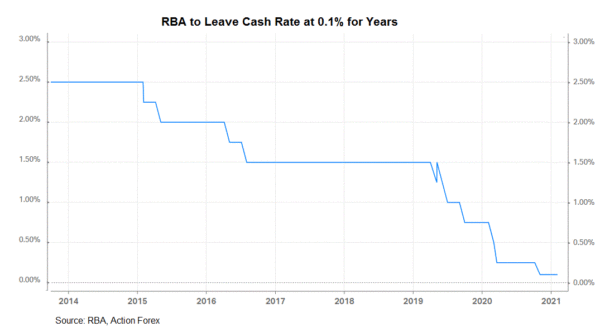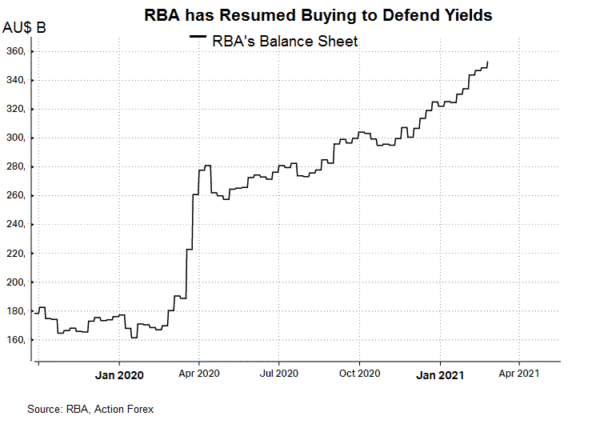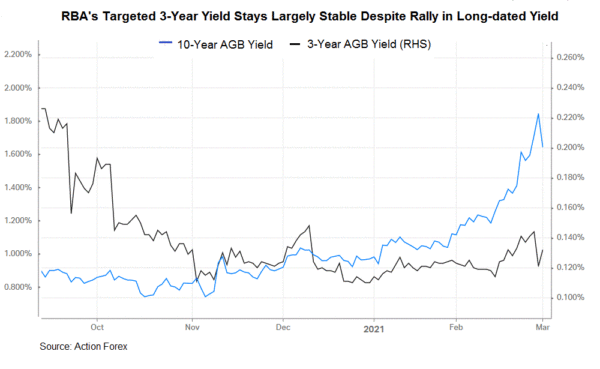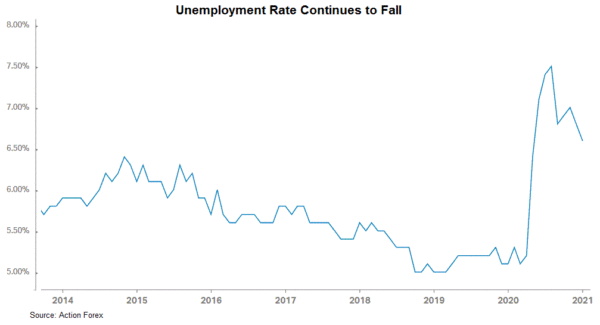At tomorrow’s meeting, the RBA should leave all monetary measures unchanged. The cash rate, 3-year yield target and the rate on the TFF program will stay unchanged at 0.1%. The QE program will likely remain intact as the central bank only doubled the size to AU$200B last month. While economic data since the last meeting have affirmed that economic recovery is underway, the developments are not distinguishable enough for adjustment. The focus of the meeting is policymakers’ view on the global rise in bond yields. The surprising announcements to raise bond purchases have, nonetheless, reinforced that the central bank is committed to keep yields low.

 The RBA has just announced to buy AU$4B of long-dated bonds (maturity ranging from November 2024 through to May 2028), following an unscheduled purchase of AU$3 billion of three-year bonds last Friday. The moves have anchored the central bank’s commitment to fight against rising yields and Australian dollar. The 10-year government bond yield rose to 1.91% last Friday before slipping to 1.85% today. This is compared with 1.18% at the previous RBA meeting. Short-dated yields are more stable, though. For instance, the 3-year yield rose to a 2-month high of 0.14% last Thursday before pullback. The level remains largely within RBA’s target.
The RBA has just announced to buy AU$4B of long-dated bonds (maturity ranging from November 2024 through to May 2028), following an unscheduled purchase of AU$3 billion of three-year bonds last Friday. The moves have anchored the central bank’s commitment to fight against rising yields and Australian dollar. The 10-year government bond yield rose to 1.91% last Friday before slipping to 1.85% today. This is compared with 1.18% at the previous RBA meeting. Short-dated yields are more stable, though. For instance, the 3-year yield rose to a 2-month high of 0.14% last Thursday before pullback. The level remains largely within RBA’s target.

Economic developments since the last meeting have shown continuous improvement. However, the strength has tamed when compared with half a year ago. The unemployment rate slipped -0.2 percentage point to 6.4% in January. The number of payrolls added +29.1K, missing consensus of +40K and December’s +50.1K. While staying in the expansionary territory, Markit’s manufacturing PMI dropped -0.3 point to 57.2 in February. Yet, this remains a strong figure and signals resilience in the sector. As suggested in the report, the index reveals “solid gains in production and order books in February, adding to signs of a strong start to the year and setting the scene for the sector’s best quarter for three years”. However, companies remained cautious in hiring amidst concerns over rising costs. Indeed, labor cost has shown signs of acceleration towards to the end of last year. The wage price index improved to +0.6% q/q in 4Q20, accelerating from +0.1% in the prior quarter. The reading also rose +1.4% from the same period last year.

The forward guidance will stay unchanged, reiterating that “the Board will not increase the cash rate until actual inflation is sustainably within the 2 to 3% target range. For this to occur, wages growth will have to be materially higher than it is currently. This will require significant gains in employment and a return to a tight labour market. The Board does not expect these conditions to be met until 2024 at the earliest”.
Early last month, Governor suggested that the central bank will review the yield curve control program by mid-2021 to decide whether to progress its purchase program from buying April 2024 bonds to buying November 2024 bonds. The market does not seem to expect an extension given the domestic and global economic outlook. We will watch if the central bank hint about this tomorrow.
